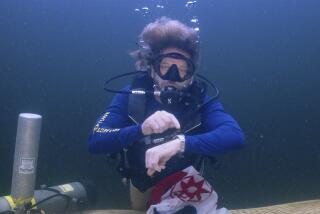Shark Bite Seriously Injures ‘Bold’ Researcher
- Share via
MIAMI — A shark expert known for unusual research methods and “pushing the envelope” in his study of the feared marine predator’s behavior was badly bitten by a shark in the Bahamas, colleagues said Thursday.
Dr. Erich Ritter, chief scientist for the Princeton, N.J.-based Global Shark Attack File, was bitten in the calf by what was believed to be a 350-pound bull shark during filming of a Discovery Channel program off Walker’s Cay, Bahamas, on Tuesday.
“It was a serious injury,” said Marie Levine, executive director of the Shark Research Institute in Princeton. “He’s going to be in the hospital for four or five more weeks.”
A series of particularly gruesome shark attacks, including one where an 8-year-old boy lost an arm to a bull shark in Florida, earned international media attention last summer, although the year turned out to be an average one with 76 attacks recorded worldwide.
Experts say shark attacks are very rare and may be increasing only because more people are using the oceans for recreation.
Ritter, 43, was bitten in murky, waist-deep water as he worked with lemon, black-tip and bull sharks for the television program, Levine said.
It appears the bull shark was chasing a remora, a smaller fish, and bit Ritter by accident.
“There was food in the water about 15 yards from Erich. A bull shark closed on the remora but in the low visibility bit Erich instead,” she said.
The shark’s teeth went to the bone and Ritter was rushed to a hospital in West Palm Beach, Fla., where he underwent an arterial graft and possibly a skin graft on the calf wound, she said.
“They were really pushing the envelope,” Levine said. “This is one of those things that can happen when you’re working with big animals and it was an accident.”
But Dr. Sam Gruber, a University of Miami shark expert who worked with Ritter in the 1990s, said Ritter’s methods were not accepted by the scientific community and called him “an accident waiting to happen.”
“He has been getting more and more fearless, or some would say bold. This method is basically to titillate TV cameras,” Gruber said.
Gruber said Ritter believed his study of the marine predators had made him immune to shark bites and called his methods damaging to those trying to do “legitimate” research on sharks.
“He believes he can read the minds of sharks and that he knows everything about shark behavior so he can predict what they are going to do,” Gruber said. “Those predictions will never be accurate enough to say, ‘This is what will happen 100% of the time.’ ”
More to Read
Sign up for Essential California
The most important California stories and recommendations in your inbox every morning.
You may occasionally receive promotional content from the Los Angeles Times.










